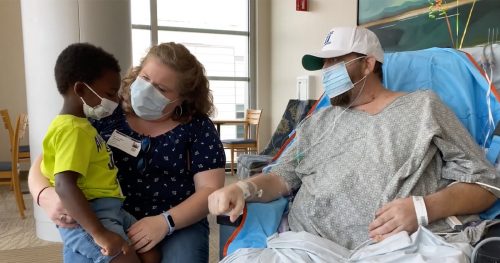Chief’s message:
Thanksgiving is a time of reflection and gratitude. We hope of our extended Duke Heart Family and colleagues had some time to spend with family, friends and the loved ones. Most importantly, we hope you all had some time to remember and embrace those that enrich our lives.
Highlights of the week:
Carmat Patient Receives New Human Heart
A surgical team led by Drs. Jacob Schroder and Carmelo Milano, has successfully explanted the Carmat new-generation

total artificial heart that was placed into an end-stage heart failure patient at Duke in July. Matthew Moore of Shallotte, N.C., lived with the device for four months. On Monday, Nov. 22, Moore received a donor heart during transplant surgery at Duke University Hospital.
Carmat’s artificial heart, which is approved for use in Europe, is an implantable prosthetic that includes biological valves derived from bovine tissue. It operates on an external power supply. Duke became the first center in North America to implant the prosthetic device, which is currently being studied at four U.S. locations as a bridge to transplant.
“The use of the Carmat total artificial heart system to successfully bridge a patient to heart transplantation at Duke is a milestone for heart failure patients in the United States,” said Schroder, surgical director of Duke’s heart transplant program. “The device is designed to be significantly more hemocompatible, and should greatly reduce thromboembolic events. This is a major advance from previously available devices.”
 If the device receives FDA approval, it would provide a bridge to transplant for patients whose hearts require assistance to pump blood through both chambers. Current technology – notably a left-ventricular assist device (LVAD) — supports just one chamber.
If the device receives FDA approval, it would provide a bridge to transplant for patients whose hearts require assistance to pump blood through both chambers. Current technology – notably a left-ventricular assist device (LVAD) — supports just one chamber.
“The successful performance of heart transplantation in our patient following initial use of the Carmat total artificial heart system as a temporary support measure is a first in this country,” said Edward P. Chen, MD, chief of the Division of Cardiovascular and Thoracic Surgery in Duke’s Department of Surgery. “This device will ultimately transform care of patients with end stage cardiac disease. We are privileged at Duke to have a team which pursues delivery of the highest-quality patient care and is constantly looking to improve upon this care through innovation.”
Congratulations to Schroder and Jason Katz, co-principal investigators at Duke for the Carmat Total Artificial Heart (TAH) Early Feasibility Study, and to their clinical research team; to Carmelo Milano and our cardiothoracic surgical team; to Sharon McCartney, Sachin Mehta and our cardiac anesthesiology team members; to Adam DeVore and our heart failure team; to our mechanical circulatory support program; our VAD coordinators; the perfusion team, and to the nursing staff of the CTICU and clinical stepdown units.
We are truly blessed with amazing team members across Duke Heart!
Kahsai Receives CVRC’s 2021 Headley Family Award
 Alem Kahsai, PhD, an assistant professor of medicine in the division of cardiology, has received the 2021 Headley Family Award for research within the Duke Cardiovascular Research Center (CVRC). The award to Kahsai, a medicinal and chemical biologist, is for his project ‘Towards understanding the roles of β-arrestins in Alzheimer’s Disease and cardiovascular disorders.’
Alem Kahsai, PhD, an assistant professor of medicine in the division of cardiology, has received the 2021 Headley Family Award for research within the Duke Cardiovascular Research Center (CVRC). The award to Kahsai, a medicinal and chemical biologist, is for his project ‘Towards understanding the roles of β-arrestins in Alzheimer’s Disease and cardiovascular disorders.’
His project aims to understand the similarities between amyloid-β peptide deposits that occur between neurons in the brain (a hallmark event in the development of Alzheimer’s disease) and cardiac amyloid-β peptide deposits in heart and vascular tissues that are the hallmark of many cardiovascular diseases. Cardiac amyloid-β peptide deposits are associated with cardiomyocyte dysfunction, while vascular deposits promote stiffening, inflammation, and atherosclerosis.
There appears to be a positive correlation between increased levels of β-arrestins—key regulators of a class of cell surface receptors called G-protein-coupled receptors—with enhanced γ-secretase activity and the production of amyloid-β peptide in post-mortem brains from Alzheimer’s disease patients compared to healthy controls, Kahsai says. The mechanism by which β-arrestins regulate γ-secretase activity is elusive, and it is this mechanism that he plans to explore.
“Thanks to the Headley award, I can move forward in my research and obtain preliminary data to see the bigger picture,” says Kahsai. “We are trying to devise small molecule drugs that target β-arrestins in the context of Alzheimer’s disease as well as a number of cardiovascular problems, in particular atherosclerosis.”
Funding through the Headley Award will enable Kahsai to reconstitute each component of the γ-secretase- β-arrestin complex outside of the cell and determine how β-arrestins directly regulate γ-secretase activity and thus amyloid-β peptide production within neuronal cells. He hopes the findings from his studies will potentially open a new avenue for therapeutic development through targeting γ-secretase regulating proteins, such as β-arrestins.
He says it is paramount to identify therapeutic targets in order to slow the progression of amyloid-β peptide accumulation in the context of both cardiovascular and neurological disease.
“The CVRC is fortunate to have generous support from donors such as Mr. Headley and his family, who are interested in investing in the basic cardiovascular research that’s so necessary to continue to improve patient treatment and outcomes,” says Maria Price-Rapoza, executive director of the CVRC.
The Headley Family Award was established in 2020 and is made possible through the generosity of Harry and Dorothy Headley in support of basic cardiovascular research at Duke. The award provides annual one-year seed grants of $25,000 (plus indirect costs at 15 percent) targeted toward CVRC researchers who are conducting innovative research into the causes and treatment of hypertension, atherosclerosis and related cardiovascular diseases. The leadership of the Duke CVRC is deeply grateful for the support the Headley’s have provided to our research team.
The award is effective as of Nov. 1. Congratulations, Alem!
Katz Featured in CardioNerds Podcast
CardioNerds has launched a Cardiac Critical Care Series on their podcast and have kicked it off with an episode featuring our own Jason Katz, director of Cardiovascular Critical Care and co-director of Mechanical Circulatory Support and the CICU at Duke. Check it out here: https://apple.co/3HQMJEf.
It’s a good interview and well worth checking out. Great job and congratulations, Jason!

Cardiac Sonography Program Update
Congratulations to Richard Palma, director of the Duke Cardiac Ultrasound Certificate Program, who was recently inducted into the Society of Diagnostic Medical Sonography‘s (SDMS) Board of Directors. The SDMS is the largest association of sonographers and sonography students in the world. Congrats, Richie!

Palma gave three presentations at the SDMS national meeting held Sept. 29-Oct. 2 at the Hyatt Regency in Atlanta. Palma is shown here with two of his former students who were also invited speakers at SDMS. On the left in the photo is Daniel Bourque, MS, ACS, FASE who is the lead cardiac sonographer for Orlando Regional Medical Center; in the center is Palma, and to the right is Laura Phillips, BS, RDCS, RVT, who is with Yale New Haven Hospital and serves as program director for the vascular ultrasound program at the Hoffman Heart Institute of Connecticut.
Hanukkah Wishes
On behalf of the Duke Heart leadership team, we wish all who will be celebrating Hanukkah a peaceful holiday filled with unexpected blessings. It’s up to each of us to be a light in the darkness — even a little light can go a long way.

Upcoming Events & Opportunities
Cardiology Grand Rounds
December 1: The Pathophysiology and Natural History of Perioperative Atrial Fibrillation: Transient Nuisance or Cause for Concern with Bernard Gersh of the Mayo Clinic, Rochester, MN. 5 p.m. Webex.
December 7: Visiting lecture with Anubha Agarwal of Northwestern Medicine.
Training Workshop
November 30 & December 14: Stepping in 4-Respect (SI4R) Workshop for Duke Division of Cardiology. 5-7 p.m. Zoom (Details in email from Kim Dorman)
As part of the Department of Medicine Civility Champion initiatives, a 2-hr zoom workshop for all faculty, staff, and trainees throughout all DOM divisions has been developed. Civility Champions are trained faculty, fellows, and chief residents who provide informal support in response to incidents of bias, harassment, or other unprofessional behaviors, and to help those affected understand their options for intervention and reporting. People generally come to Civility Champions after the fact, and the Champions debrief their experiences every quarter.
The workshop that Drs. John Duronville, Jane Gagliardi, Anita Kelsey, Camille Frazier-Mills, Daniella Zipkin, Laura Previll, and Sophia Weinmann will be presenting to the Cardiology clinical faculty is entitled Stepping In 4-Respect. It is being offered twice and is a new component of these civility efforts designed to teach faculty the skills needed to step in (be an “upstander”) in the moment, with a particular focus on race-, ethnicity- and gender-based incidents. This workshop is supported by Dr. Kathleen Cooney, Chair of the DOM, and will be provided to each division’s faculty over the coming months.
Please be sure to attend the workshop on one of these dates (November 30th or December 14th). Additional details about registration, the structure and goals of the workshop appeared in the email invitation.
Save the Date & Support the Marfan Foundation
February 11: An Evening with Heart to benefit The Marfan Foundation. 7-10 p.m. at The Maxwell in Raleigh, NC. A Valentine’s Day weekend event with silent auction, cocktails, heavy hors d’oeuvres and entertainment. Cocktail attire. Tickets required. For information, visit: https://bit.ly/3cHIBYD.
The Duke Center for Aortic Disease, led by cardiovascular surgeon Chad Hughes, works closely with Marfan patients, their family members and the Marfan Foundation. We are the only location in NC offering access to comprehensive aortic surgical interventions as well as coordinated cardiovascular care and genetic counseling for patients with Marfan syndrome and other connective tissue disorders such as Loeys-Dietz. If you’re interested in learning more about the work being done at Duke or would like to partner or otherwise get involved, please contact Dr. Hughes or Melissa Merrill Burkett, ACNP.
Have news to share?
If you have news to share with the Pulse readership, please contact Tracey Koepke, director of communications for Duke Heart at tracey.koepke@duke.edu. We would love to hear about your latest accomplishments, professional news, cool happenings, and any events or opportunities that may be of interest to our Duke Heart family. Please call with any questions: 919-681-2868. Feedback on Pulse is welcome and encouraged. Submissions by Noon, Wednesdays, to be considered for weekend inclusion.
Duke Heart in the News:
November 19 — Stephen Greene
Medscape
Fewer Strokes on Myosin Activator in Reduced-EF Heart Failure: GALACTIC-HF
https://duke.is/c4e9x
November 19 — Manesh Patel
U.S. News & World Report
Advances in Care, Impact of COVID Highlights of Latest Cardiologists’ Meeting
https://duke.is/8ezmf
November 20 — Manesh Patel
UPI
Pandemic has made heart healthcare more difficult, doctors say at meeting
https://duke.is/w8bz6
November 23 — Sreekanth Vemulapalli
tctMD
US Aortic Valve Trends in Older Patients Hint at Better Outcomes, Access
https://duke.is/ykbht
Recent Comments